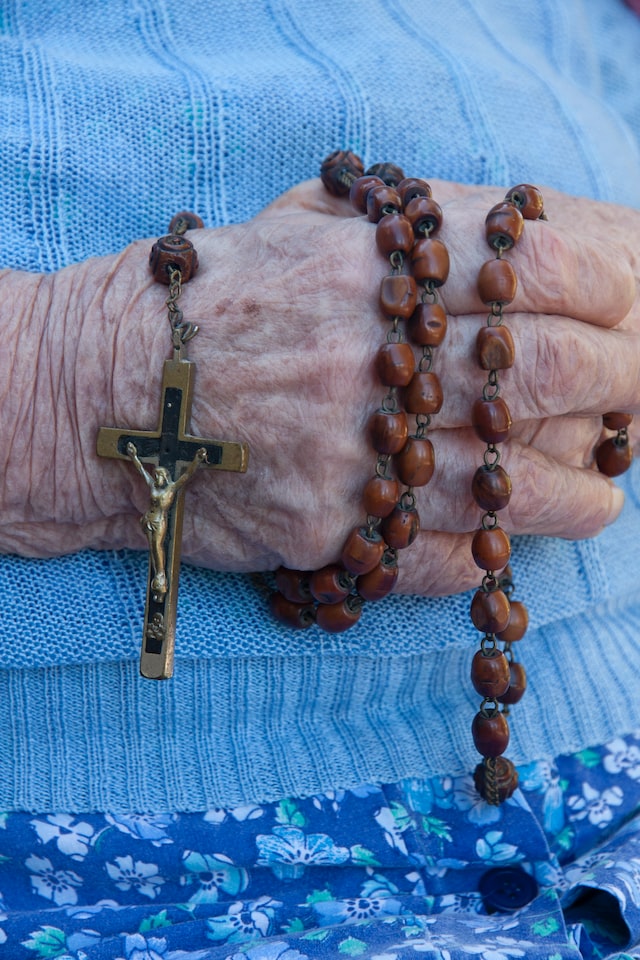Three online shops that sell rosaries have reported a boost in sales following a controversial article published Sunday in The Atlantic magazine which attempted to link the rosary to right-wing extremism in the United States.
Newsroom (17/08/2022 12:00 PM Gaudium Press) In an article in The Atlantic Magazine, Daniel Panneton claims that “The rosary has acquired a militaristic meaning for radical-traditional (or “rad trad”) Catholics.”
“Militia culture, a fetishism of Western civilization, and masculinist anxieties have become mainstays of the far right in the U.S.—and rad-trad Catholics have now taken up residence in this company,” he continued.
The article sparked a frenzy of comments on social media, as Catholics shared photos of their rosaries. Some observed that the article’s thesis had an anti-Catholic bias.
The magazine later changed the article’s headline from “How the Rosary Became an Extremist Symbol” to “How Extremist Gun Culture is Trying to Co-Opt the Rosary.” Among other edits to the text, a rosary picture replaced a series of bullet holes in the shape of a rosary. These editorial changes, nonetheless, left intact the article’s thesis that there is a connection between the rosary and extremism. The author’s contention was based, in part, on his observations about the use of the rosary on social media and rosaries sold online.
Asked to comment on the article, Robert P. George, professor of political theory at Princeton University and former chairman of the United States Commission on International Religious Freedom (USCIRF), told CNA:
“It looks to me like the guy who is politicizing the rosary and treating it as a weapon in the culture war is … Daniel Panneton. I know nothing about the guy other than what he says in the article. I hadn’t heard of him before. Although it’s hard to miss the classic anti-Catholic tropes in the piece, perhaps he isn’t actually a bigot. Maybe he just overwrought and needs to take an aspirin or two and lie down for a while.”
Chad Pecknold, a theology professor at the Catholic University of America, told CNA the publication of the article points to a “theo-political” conflict in the culture.
“The politically elite core in left-liberal media hate Western civilization and they mean to topple every natural and supernatural sign of it. That’s why it’s not sufficient to simply run a piece on right-wing gun cultures, but they must tie it to something which is theologically central to the civilization they feel most threatens their progressive ziggurat. It’s a sign of the theo-political conflict which now grips us; even still, they severely underestimate the power of Our Lady to reign victorious over evil,” Pecknold said.
Fr. Pius Pietrzyk, OP, a Dominican priest of the Province of St. Joseph, told CNA, “The article is a long-running stream of inaccuracies, logical fallacies, and distortions.”
The author, he said, fails to understand that “the notion of ‘spiritual combat’ has been with the Church from time immemorial. Recall that a traditional view of Confirmation is that it made one a ‘soldier for Christ.'”
“The problem is that The Atlantic does not seem to understand what metaphor means. In no wise, does the notion of rosary as ‘combat’ imply physical violence,” Pietrzyk added.
Shannon Doty, CEO of Rugged Rosaries, told CNA Monday that she saw “a pretty good boost in sales” on both of her websites, RuggedRosaries.com and MonkRosaries.com.
Rugged Rosaries sells durable rosaries inspired by rosaries used in the military during World War I.
Doty said that both websites have a loyal customer base and added: “we are not discouraged, and are in fact strengthened in our determination to make strong rugged rosaries for everyone.”
Doty began making rosaries out of paracord for her son’s friends in the army more than ten years ago. She began selling a “Soldier’s Combat Rosary,” which gradually turned into a business.
Jonathan Conrad, the founder of the Catholic Woodworker, told CNA Tuesday that his company had the best sales day of the month on Monday.
“It wasn’t anything special relative to the rest of the year, but best this month,” he said.
The mission of Catholic Woodworker, he said, “is to equip families for battle in the modern world, with a scriptural emphasis that we are not contending with flesh and blood, but against the principalities, against the powers of this present darkness.
The World Apostolate of Fatima USA in Asbury, New Jersey, has also reported a boost in sales of the rosary since The Atlantic article was published.
David Carollo, executive director of the apostolate, told CNA Tuesday that there was a sure boost in sales of the rosary and other religious items. He said there has been lots of “buzz” since the “downright insulting” article ran and added that he plans to reply. He noted that the World Apostolate of Fatima USA’s social media also gained more followers.
“We don’t pray against people, we pray for people,” he added. “That’s what the rosary is all about.”
Fr. Donald Calloway, M.I.C., whose talk on the rosary has received over 2 million views on YouTube, told CNA Tuesday that he did not know whether there was a boost in sales at his congregation’s online gift shop. However, he did report a “massive increase” in followers on his social media accounts.
– Raju Hasmukh
(With Files from CNA)



































